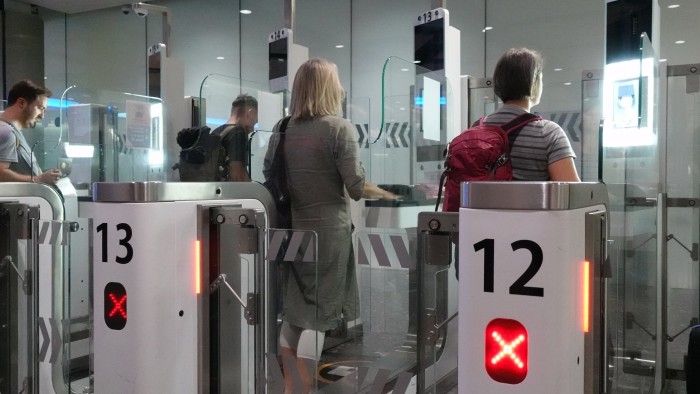A so-called breakthrough allowing Britons to use electronic passport gates across the EU — touted as a major victory this week by Sir Keir Starmer’s government — would have happened even without Monday’s historic post-Brexit agreement.
A broader reform of European border checks that has been planned for years will allow non-EU nationals from around the world to use “e-gates” at airports across the bloc.
Monday’s agreement, which was heavily criticised by UK opposition parties, will streamline food exports to the EU but also cement access for European fishing fleets to British waters for a further 12 years.
As it sought to highlight “wins” from the deal, Downing Street played up the use of e-gates instead of physical passport checks.
“Instead of waiting in long queues at passport control, Brits travelling to Europe will now be able to use e-gates,” Number 10 said. “So you can start your holiday sooner.”
But rather than being a unique bilateral agreement, the changes will come as part of a broader reform of the EU’s border crossings under the so-called Entry/Exit System (EES), which will introduce electronic checks for all non-EU nationals.
It will still be up to individual countries to install the new systems, and they will have discretion over who can use them, officials cautioned.
Starmer said on Monday that the deal should enable easier travel for Britons but admitted that it was now up to European countries to “make this a reality without delay”.
Sir Ed Davey, leader of the Liberal Democrats, said: “While the prime minister boasts about a deal on e-gates, it sounds like the government is actually still just circling the runway.”
Instead of waiting in long queues at passport control, Brits travelling to Europe will now be able to use e-Gates.
So you can start your holiday sooner. pic.twitter.com/O7JuXbqdfP
— UK Prime Minister (@10DowningStreet) May 19, 2025
The EES will require non-EU nationals to register their biometric information, including photos and fingerprints, when they first enter the bloc. Airlines and airports have in the past warned that this process could lead to longer queues as the system is being rolled out.
The EES will then use this information to automatically analyse who has a right to enter the EU and for how long, making checks faster in the long run.
People who have the right to freely move in the EU, such as Britons who were living in the EU before the expiry of the post-Brexit period in 2020, will not be subject to the checks.
The European Commission said: “The introduction of the EES will open the possibility to use e-gates for all non-EU citizens, including UK citizens. This will contribute to fluidity at borders for both entry and exit.”
It pointed out that the specific use of electronic passport gates was up to the member states. “E-gates are managed by individual Member States, and there is no requirement for them to install or allow their use at all border points. Once the Entry/Exit System (EES) is in place, UK nationals will therefore be able to use e-gates where they are available, provided they are registered in the system.”
British officials have privately conceded that the EU-UK agreement simply clarifies that there will be no obstacles to Brits using e-gates under the bloc’s new electronic border checks.
The text states that “there will be no legal barriers to e-gate use for British Nationals travelling to and from European Union Member States after the introduction of the European Union Entry/Exit System.”
Assita Kanko, the MEP leading parliament negotiations on the new border checks, said the EES “always left the possibility of using self-service systems or e-gates . . . So there indeed was never a legal barrier”.
She added: “Now there is a stronger commitment from the EU and its member states to actually allow British nationals to access those e-gates.”
Anton Spisak, from the Centre for European Reform think-tank, said: “It’s important to remember that individual member states have discretion over how they manage their borders, and this deal doesn’t alter that.”
European lawmakers and representatives of the EU member states on Monday agreed on a phased start for the new system following a series of delays in its implementation, after Germany, the Netherlands and France had raised concerns about the computer systems.
The three countries still need to declare their readiness before the system can start. While an official rollout date has not yet been set, the commission on its website said “it is expected to start in October 2025”.
EU officials, meanwhile, downplayed the UK’s overenthusiastic messaging regarding the agreement.
“It’s good we’re getting closer. How this is then implemented in practice remains to be seen,” said one EU diplomat. Another added: “It’s a sign of a good deal when both sides are happy with the outcome.”




